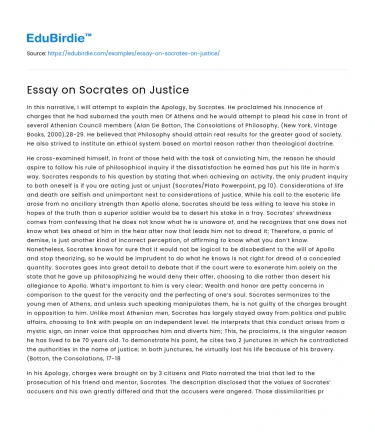In this narrative, I will attempt to explain the Apology, by Socrates. He proclaimed his innocence of charges that he had suborned the youth men Of Athens and he would attempt to plead his case in front of several Athenian Council members (Alan De Botton, The Consolations of Philosophy, (New York, Vintage Books, 2000),28-29. He believed that Philosophy should attain real results for the greater good of society. He also strived to institute an ethical system based on mortal reason rather than theological doctrine.
He cross-examined himself, in front of those held with the task of convicting him, the reason he should aspire to follow his rule of philosophical inquiry if the dissatisfaction he earned has put his life in harm's way. Socrates responds to his question by stating that when achieving an activity, the only prudent inquiry to both oneself is if you are acting just or unjust (Socrates/Plato Powerpoint, pg 10). Considerations of life and death are selfish and unimportant next to considerations of justice. While his call to the esoteric life arose from no ancillary strength than Apollo alone, Socrates should be less willing to leave his stake in hopes of the truth than a superior soldier would be to desert his stake in a fray. Socrates’ shrewdness comes from confessing that he does not know what he is unaware of, and he recognizes that one does not know what lies ahead of him in the hear after now that leads him not to dread it; Therefore, a panic of demise, is just another kind of incorrect perception, of affirming to know what you don’t know. Nonetheless, Socrates knows for sure that it would not be logical to be disobedient to the will of Apollo and stop theorizing, so he would be imprudent to do what he knows is not right for dread of a concealed quantity. Socrates goes into great detail to debate that if the court were to exonerate him solely on the state that he gave up philosophizing he would deny their offer, choosing to die rather than desert his allegiance to Apollo. What’s important to him is very clear; Wealth and honor are petty concerns in comparison to the quest for the veracity and the perfecting of one’s soul. Socrates sermonizes to the young men of Athens, and unless such speaking manipulates them, he is not guilty of the charges brought in opposition to him. Unlike most Athenian men, Socrates has largely stayed away from politics and public affairs, choosing to link with people on an independent level. He interprets that this conduct arises from a mystic sign, an inner voice that approaches him and diverts him; This, he proclaims, is the singular reason he has lived to be 70 years old. To demonstrate his point, he cites two 2 junctures in which he contradicted the authorities in the name of justice; In both junctures, he virtually lost his life because of his bravery. (Botton, the Consolations, 17-18
Save your time!
We can take care of your essay
- Proper editing and formatting
- Free revision, title page, and bibliography
- Flexible prices and money-back guarantee
In his Apology, charges were brought on by 3 citizens and Plato narrated the trial that led to the prosecution of his friend and mentor, Socrates. The description disclosed that the values of Socrates’ accusers and his own greatly differed and that the accusers were angered. Those dissimilarities produced conflict between the two parties that climaxed in his trial. With the comprehension that a jury condemned Socrates to death and his protection nevertheless satisfied him because he gave it honestly, it is most practical to call it a good defense because Socrates felt it was the best he could do at that time.
In the end, regarding adversity or condemnation, Socrates addresses the people of Athens and encourages them to follow the Socratic example and act like athletes who are in training for the Olympics. Ibid., 33-34. He also makes a valid point when explaining what to do, to those who are in favor of plans to kill him, he explained that rather than listen to what everyone says about you, focus on what those individuals who are experts in justice and injustices have to say. Ibid., 34-35. According to Socrates, virtue is knowledge which includes understanding why certain things are true, and why the substitutes are incorrect.Ibid.,25. Socrates professed that he started to visualize himself as a spokesperson of the oracle’s words.
Alternatively, instead of professing to have a great deal of knowledge on certain issues, he chose to affirm his inexperience. In the end, he was able to maintain his integrity and be himself. Because he was found guilty, his punishment was to drink a poisonous substance that would eventually end his life. The foremost Socratic irony is that although people are rational when they divulge that they know nothing, Socrates believed that people honestly were illiterate.






 Stuck on your essay?
Stuck on your essay?

